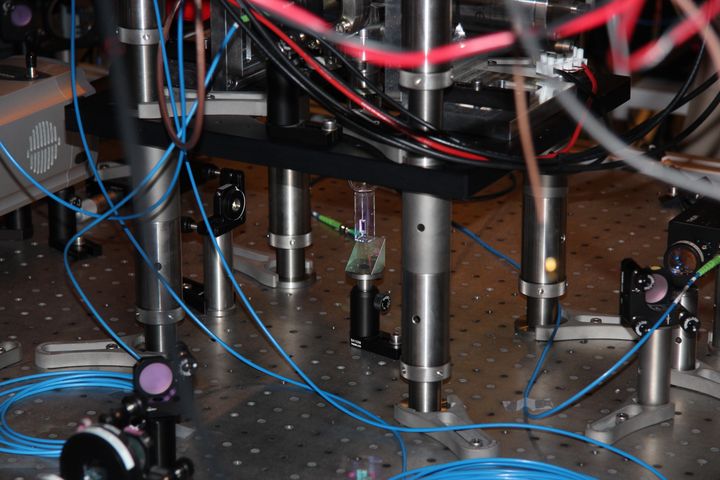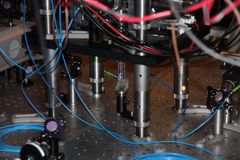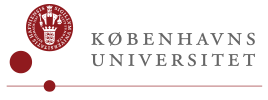Quantum researchers come up with a recipe that could accelerate drug development
University of Copenhagen mathematicians have developed a recipe for upgrading quantum computers to simulate complex quantum systems, such as molecules. Their discovery brings us closer to being able to predict how new drugs will behave within our bodies and has the potential to revolutionize pharmaceutical development.

Developing a new drug can take more than a decade and cost anywhere from hundreds of millions to billions of euro — with multiple failed attempts along the way. But what if we could predict how a drug worked in the body before its laboratory trials, and in doing so, speed up the entire process from years to months?
Drugs are composed of molecules, which in turn consist of atoms. And since atoms behave in a quantum mechanical manner, a quantum computer is needed to mimic their behavior. Herein lies the challenge. A traditional computer — no matter how big — could never manage the vast amount of information required by the task with the same precision.
At the University of Copenhagen’s Quantum for Life Centre, a team of physicists, computer scientists, and mathematicians has dedicated years of their careers to understanding how so-called quantum simulators, a type of specialized quantum computer, can be deployed for this task: to simulate, and in doing so predict, the behaviour of molecules.
It’s all about size, or is it?
One fundamental problem that all quantum computer researchers struggle with is size. Today’s quantum computers are simply too small. In practice, this means that they can only simulate a few atoms, which is problematic, because the complex molecules in medicinal drugs often contain millions of atoms.
Now, the Quantum for Life team has taken a significant step toward solving this problem by coming up with a mathematical recipe for making it easier to program quantum simulators, and in doing so, extract more computing power from a simulator of the same size.
“Quantum simulators consist not only of quantum hardware, but of quantum software too — essentially, the recipe for using the quantum simulator. With these new results, we are making a major leap on the software side, presenting a much better method than we’ve had before to scale up the existing hardware and solve more complex tasks,” says Dylan Harley, the research paper’s first author and a doctoral student at the Quantum for Life Centre.
The conventional wisdom about how to scale up a quantum simulator has been that it would need to be built from the ground up. The new quantum algorithm addresses this obstacle and is at the core of the quantum software. The algorithm introduces a controlled amount of noise among the particles being simulated, so as to ensure that the simulation does not stall, but carries on as desired. The idea is of a general nature and can be applied to any type of quantum hardware, regardless of whether it is based on atoms, ions, or even artificial atoms like superconducting qubits.
Could revolutionize pharmaceutical development
“Quantum technology is seen as the key to creating the new and improved medicines of the future. But without the ability to scale quantum simulators effectively, their practical use is very limited. That is why it’s essential to find out how our quantum software can support this scaling. And now we have a recipe to do just that,” says Matthias Christandl, professor of quantum theory and centre leader at the Quantum for Life Centre.
According to Christandl, the prospects will be revolutionary if the researchers succeed in developing an effective quantum simulator:
“If we can use a computer to simulate how a new drug will behave in a human body before conducting any experiments, it could fundamentally change the way we develop and test pharmaceuticals, which will significantly accelerate the amount of time from lab to patient.”
The next step will be to test the mathematical recipe on quantum hardware.
-------------------------------------------------------------------------------------------
QUANTUM FOR LIFE CENTRE
The Quantum for Life Centre at the University of Copenhagen conducts research to develop quantum algorithms for simulating biomolecules that can then be used to study complex biochemical processes and contribute to accelerating pharmaceutical development.
The Centre is working on building a so-called quantum simulator, a type of computer that contains a controlled system of particles that can accurately mimic various quantum systems, including molecules and atoms.
The Centre combines quantum physics, mathematics, chemistry, and computer science research and is funded by the Novo Nordisk Foundation.
ABOUT THE STUDY
- The researchers behind the study are Dylan Harley, Frederik Ravn Klausen, Albert H. Werner, and Matthias Christandl from the Quantum for Life Centre, Department of Mathematical Sciences at the University of Copenhagen; Ishaun Datta from Stanford University; Andreas Bluhm from Université Grenoble Alpes, France; and Daniel Stilck França from Université de Lyon, France.
- The scientific article about the study has been published in the journal Nature Communications.
Keywords
Contacts
Matthias Christandl
Professor & Centre Leader
Quantum for Life Centre – Department of Mathematics
University of Copenhagen
christandl@math.ku.dk
+45 35 33 22 98 / +45 51 82 43 25
Dylan Harley
Ph.D. Student
Quantum for Life Centre – Department of Mathematics
University of Copenhagen
dh@math.ku.dk
+45 22 34 54 15
Maria Hornbek
Journalist
Faculty of Science
University of Copenhagen
maho@science.ku.dk
+45 22 95 42 83
Images



Links
ABOUT THE FACULTY OF SCIENCE
The Faculty of Science at the University of Copenhagen – or SCIENCE – is Denmark's largest science research and education institution.
The Faculty's most important task is to contribute to solving the major challenges facing the rapidly changing world with increased pressure on, among other things, natural resources and significant climate change, both nationally and globally.
Subscribe to releases from Københavns Universitet
Subscribe to all the latest releases from Københavns Universitet by registering your e-mail address below. You can unsubscribe at any time.
Latest releases from Københavns Universitet
Forskere genopliver gamle ærtesorter i enorm frøsamling: ”Et uudnyttet guldkammer til fremtiden”15.12.2025 10:29:09 CET | Pressemeddelelse
Med en ny AI-metode har forskere fra Københavns Universitet genopdaget 51 gamle ærtesorter, som ikke længere bruges i landbruget, men som kan vise sig lovende til produktion af plantebaserede fødevarer. Metoden er en genvej til at finde nye ressourcer i de grønne skatkamre, som genbankers enorme frøsamlinger udgør.
Fermentering gør havets grøntsager mere spiselige5.12.2025 06:18:59 CET | Pressemeddelelse
Tang har længe været hyldet som en bæredygtig superingrediens – men dens “fiskede” smag er en barriere for mange vestlige forbrugere. Nu viser et nyt studie fra Københavns Universitet, at fermentering med mælkesyrebakterier kan være nøglen til at få tangen til at glide ned.
P-piller kan forringe kvinders mentale trivsel2.12.2025 06:05:00 CET | Pressemeddelelse
Adgang til p-piller i ungdomsårene er forbundet med øget risiko for depression senere i livet. Især kan kvinder, der er genetisk disponeret for psykisk sygdom, risikere at blive ramt af bivirkningen. Det viser et nyt studie fra Københavns Universitet.
Psykologer: Derfor kan protester samle folk på tværs af politiske skel27.11.2025 09:18:05 CET | Pressemeddelelse
Hvordan kan mennesker med diametralt modsatte holdninger pludselig stå skulder ved skulder i protest? Det spørgsmål har et internationalt forskerhold undersøgt. Udgangspunktet er COVID-protesterne, som blev båret af tre samlende strategier.
Sådan bruger planter ingeniørprincipper til at trænge gennem hård jord27.11.2025 07:16:00 CET | Pressemeddelelse
Et internationalt forskerhold med Københavns Universitet, Shanghai Jiao Tong University og University of Nottingham i spidsen har opdaget, hvordan planterødder er i stand til at trænge igennem hård og tæt jord ved hjælp af et velkendt ingeniørprincip. Opdagelsen kan få stor betydning for fremtidens afgrøder i en tid, hvor presset på landbrugsjorden stiger.
In our pressroom you can read all our latest releases, find our press contacts, images, documents and other relevant information about us.
Visit our pressroom